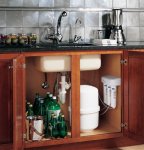Re: Reverse Osmosis Drinking Water
Much of the medical equipment I service is equipped with filtration systems that use hundreds of gallons of water per hour, this water must be clean enough to process medical devices after disinfection and be rinsed after chemical sterilization without contamination.
We use a combination of 5 micron, 1 micron and 0.2 micron filters in series using available everywhere potable water. The housings to hold them are inexpensive and the filter costs are reasonable, considering how much water a normal household would use per year I estimate you could run for a year easily between filter changes and much of the time you only need to change out the 5 and 1 micron filters which get the lions share of the particulates to restore full flow.
http://www.bigbrandwater.com/ultrapleat.html
Filter costs are around $100USD for this type of system to supply drinking water to a family of four for a year. If your water has a large degree of TDS a 10 micron pre-filter is a good idea but unless you were pulling water from a mud river its unnecessary. If your water is hard then you need a water softener to precipitate the minerals prior to filtration, BTW softened water is hard on RO filters which raises the costs since you can't eliminate the first shot of salt after regeneration. Softened water will eliminate most scale issues if your producing coffee or need to generate steam by boiling.
Filters don't restrict water flow nearly as much as RO systems with none of the wastage issue and you don't need to pump water at high pressure to get high volumes. I can't envision a situation where you need cleaner water than that unless your running a lab where Pure/WFI water is required and then you would need a still.
I install/repair those too.
http://www.steris.com/products/view.cfm?id=2004
I think people get carried away with the many types of systems available on the market and are confused by the designations. RO is for large facilities where the water is stored for later use or you need to produce DI water, its output pressure is too low for on-demand use in most situations.
0.2 micron filtration is cheap and easily installed with minimum space requirements and needs no high pressure to operate at large volumes and is ideal for on-demand use with no wastage. If you wanted to improve taste a simple carbon filter placed before the 1 micron filter and after the 5 micron filter will do that for you. Don't get carried away, a simple 3 filter+carbon setup will get you the cleanest water you will ever need...including after biological attack.
I do not recommend RO for home use unless you wanted to live on a deserted island and only had salt water available which is where RO shines in effective one pass purification/desalination.
A setup like this is all you will ever need particularly if you already have a softener, its flexible, effective and inexpensive...don't get carried away.
http://www.bigbrandwater.com/whole-house-water-filter.html




















